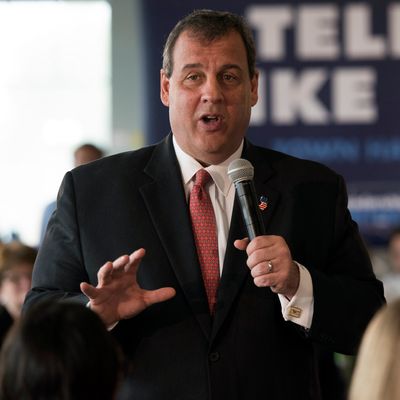
When Chris Christie becomes the 14th candidate running for the Republican presidential nomination on Tuesday, he’ll be using a campaign slogan that many find ironic: “Telling It Like It Is.” The New Jersey governor hopes the line will convey that he’s honest and forthright to a fault, though he’s been accused of being remarkably untransparent, and Tom Moran of Newark’s Star-Ledger just devoted an entire column to calling him a habitual liar.
Even if you believe that the entire Bridgegate scandal is the result of Christie being cruelly betrayed by his staff, one of the claims in the governor’s introduction video is still perplexing. “In a trusting relationship you don’t hold anything back, and if you’re going to run for president of the United States, and you’re going to ask these people for their vote, that is the single most trusting thing they can do as a citizen is to give you their support,” Christie says. “So you better tell them exactly what you’re thinking and exactly what you’re feeling.” Supposedly, that is the very essence of Christie’s “moral compass,” and yet if there’s one thing Christie’s good at (aside from berating people on the Jersey Shore while brandishing an ice-cream cone), it’s refusing to answer journalists’ questions about what he’s thinking and feeling.
Obviously, all politicians avoid questions, and there are some topics that Christie is smart to steer clear of (for instance, the Twinkie factory closing). But over the past few years, Christie has elevated not answering questions to an art form. It’s been clear for several years that Christie was gearing up for a 2016 run, and generally it’s hard to keep prospective presidential candidates from sharing their unsolicited opinions. (See: Bobby Jindal issuing a statement to say he refused to condemn Rudy Giuliani’s attack on Obama’s patriotism, though no one asked him.) However, when questioned about certain hot topics, Christie has given answers that would be weirdly non-committal if you got into a political discussion with a co-worker. When asked what he thought of a grand jury’s decision not to indict the police officer involved in the choke-hold death of Eric Garner, Christie remarked, “I’m not going to second guess that work.” As for whether he’s a moderate or a conservative, Christie told Meet the Press, “Listen, I don’t get into these labels.” And when everyone was debating the Supreme Court’s Hobby Lobby ruling last year, Christie had no opinion on the matter. “Who knows if the Supreme Court is right?” he declared on CNBC. “Why should I give an opinion on whether they’re right or wrong?” But was he worried that women could lose birth-control coverage? “No.” Why? “Because I’m not.”
What makes Christie’s dodging so impressive is that he’s found so many different ways to say “no comment.” When George Stephanopolous pressed Christie to give his opinion on immigration reform back in 2013, he suggested there wasn’t enough time. (“Well, listen, I can have an opinion about lots of things, George, but we’re not going to go through all that this morning are we?”) Last summer, he objected to being quizzed about immigration reform in an undignified location. (“I’m not going to discuss a complicated issue like immigration in a parking lot here in Marion, [Iowa].”) When he traveled to the U.K. in February, presumably to boost his foreign-policy credentials, he refused to answer a general question about the role NATO should play in the world. (“I’m not going to get into that now … Even as I’m here, in the U.K. Yeah, no, not now.”) And last month, during his first appearance following the indictment of two of his close allies in the Bridgegate scandal, he suggested NBC’s Kasie Hunt was ridiculous for asking how Americans could trust that there wouldn’t be similar issues in a Christie White House. (“That’s such a silly question I’m not even going to answer it.”) Here’s the governor in action:
To be fair, Christie has been extremely honest about why he avoids answering questions so frequently. He believes that he has no obligation to share his thoughts on tough problems facing the country, since he’s merely the governor of New Jersey (though, he reserves the right to constantly criticize Washington politicians). “If I run for president, you can be sure that I’ll have an opinion,” Christie told CNBC’s John Harwood last July. He went on to explain that he’s “ill-informed” about many national issues, and thinks it’s “quite frankly immature to be expressing a lot of those opinions just because I’m sitting up here in front of this room and you asked.” Plus, he doesn’t want to be caught on tape saying something foolish. “If I don’t think my answer is going to be smart and will stand the test of time, you can be damned sure that I’m not going to answer,” he said. “Because you’ll have this tape and you’ll use it.”
Actually, if Christie thinks he only needs to share all of his opinions if he’s officially running for president, and that’s the center of his “moral compass,” that could explain a lot.





























